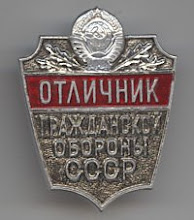Take, for instance, a subject near and dear to my heart- civil defense. If you read the page on civil defense in English, you'll learn that:
"In most of the NATO states, such as the United States, the United Kingdom or Germany as well as the {then} Soviet Bloc, and especially in the neutral countries, such as Switzerland and in Sweden during the 1950s and 60s, many civil defense practices took place to prepare for the aftermath of a nuclear war, which seemed quite likely at that time. However, there was never strong civil defense policy because it fundamentally violates the Mutually Assured Destruction doctrine by making provisions for survivors. Also, a fully fledged total defense would have been too expensive. Above all, compared to the power of destruction a defense would have been ineffective."However, click the link to the Russian version and you'll learn that:
"Наиболее развитая система гражданской обороны существовала в СССР в 1960-е — 1990-е годы." (The most highly developed system of civil defense existed in the USSR between the 1960s and the 1990s.)If wikipedia is any indication, maybe the Russians' problem was that they didn't understand what "Mutually Assured Destruction" meant. If you follow the link from the English version of that article to its Russian counterpart, you'll find yourself reading something titled Ядерный паритет- "nuclear parity."
This actually encapsulates the difference between American and Russian understandings of deterrence pretty neatly. Although it's considerably more complicated than this, it seems that the USSR lacked figures like Bernard Brodie and Herman Kahn who thought of nuclear war in the form of idealized game-theory abstractions. From their perspective, the United States regularly threatened them with nuclear attack- in Berlin in 1948, the Taiwan Straights in the 1950s, Berlin in 1961, and so on- until they reached a state of approximate strategic parity. At this point the US began acceding to things like SALT and the ABM Treaty, and according the USSR a new degree of respect. "Parity" remains a critical component of contemporary Russian thinking about nuclear arsenals, as is attested by the 2000 Military Doctrine of the Russian Federation:
«[Россия] готова к дальнейшему сокращению своего ядерного оружия на двусторонней основе… до минимальных уровней, отвечающих требованиям стратегической стабильности» (Russia is prepared for continued nuclear arms reductions on an equitable basis... to the minimum levels meeting the needs of strategic stability.)This implies that the Russian government believes that reducing its nuclear capabilities too far below those of the United States would be inherently destabilizing- without regard to concepts like "assured destruction." Interesting, no?

2 comments:
I thought "наиболее" meant "the most?" Like "The most highly developed system..."
That would make it even more different from the English version, no?
That it is, although the actuality may not have quite lived up to that bit of hyperbole. I shouldn't try and write this stuff when I'm sleep-deprived. Gaaaaghhh.
Post a Comment